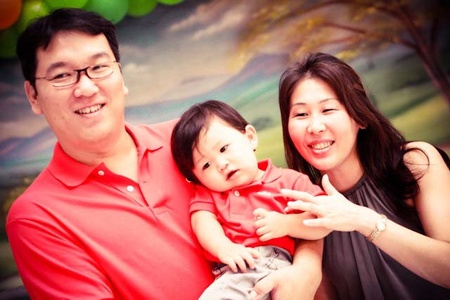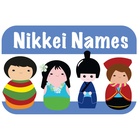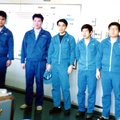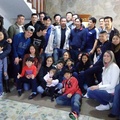Rrrring! Rrrrring! “Hello?” “Who am I speaking with?” “........” I needed some time to answer who it was. I was trying to recognize the voice at the other end of the line before saying my name. My relatives and my family and nihongogakko friends call me Mamoru, but everybody else knows me as Claudio. Mamoru isn’t found in official documents, but some people, even my relatives, either don’t know or don’t remember that I’m also Claudio. When I learned that my wife Cristiane was pregnant, I was sure of one thing: my son won’t have to deal with this sort of confusion! He is going to have only one name!
I was born in 1971, in São Bernardo do Campo, in the Greater São Paulo area. I’m 75% Sansei and 25% Yonsei, for my grandmother Miyoko Sampei (actually, erroneously recorded as Mioco at the City Clerk’s Office), who used to live with me, was born in Brazil, more precisely in Santo Anastácio, in the interior of São Paulo. My great-grandfather Asami Honda (born Anzai), from Fukushima, arrived in 1912 aboard the Itsukushima-maru, the fourth immigrant ship to dock at Santos. My great-grandmother Hana Honda (née Saito), also from Fukushima, arrived in 1913 aboard the Wakasa-maru. My other grandparents—Toyo Takeuchi (born Ueno), Itsumu Sampei, and Shusuke Takeuchi—all arrived before World War II, having come from Hokkaido (1930), Chiba (1931), and Akita (1933), respectively. My parents, Jorge (who actually should have been Jouji, but the City Clerk’s Office had his name recorded as Jorge) and Irene (Japanese name: Kiyoco, recorded with a “c” instead of a “k”), have told me that my names were chosen by my grandmother Miyoko. The big TV hit at the time was the soap opera Brothers Courage, and two of the three actors playing the brothers were named Claudio: Cláudio Cavalcanti and Cláudio Marzo. I think that’s why so many men of my generation have that name, even the Nikkei. Mamoru was chosen for no special reason, but following the family custom, the Japanese name wasn’t registered at the City Clerk’s Office. The name in Japanese would have been difficult to write down when I was learning to read and write.
Since my son has cousins on my wife’s side in Japan—and they don’t even speak Portuguese—he would have to have an easily pronounceable name both in Brazil and in Japan. And since we have friends in various parts of the world, it’d have to be a name that wouldn’t embarrass him anywhere, whether by its meaning or pronunciation. We searched the Internet, researched books, and finally we came up with Naoki. As it was a Japanese name, we even chose its kanji. “Nao” would be the same as that of his great-grandfather on his mother’s side, Naomichi, while “Ki” would be the “Teru” of Teruaki, a third cousin of mine in Japan with whom I keep in touch. We also looked into Japanese numerology, according to which the family name Sampei and the ideograms chosen for Naoki would result in a very well-balanced combination.
My wife would walk up and down with her huge belly, and one of the questions everyone asked was: “Have you chosen a name?” Several times, while among coworkers, she answered: “Naoki”. Another question would then come up: “But wasn’t it going to be a boy?" For some Brazilians, Naoki sounds like a girl’s name. That left my wife concerned, and for that reason the story of a “Brazilian” name came up. I was against it. But due to her insistence, the name Victor was chosen. Victor was a simple name and it was well known in many places around the world. After our son’s birth, at the time of registering his name at the City Clerk’s Office, I once again hesitated. He almost became only Naoki. But I couldn't have gone against his mother at that moment.
He was born on December 17, 2008—the year marking the centenary of Japanese immigration to Brazil; on the anniversary of the foundation of Bunkyo, the Brazilian Society of Japanese Culture; with ancestors from Hokkaido, Akita, Gunma, Chiba, Tokyo, and Nagasaki; and in São Paulo, the city with the largest number of Japanese descendants in the world: Victor Naoki Sampei, with a typical Nikkei-Brazilian name. Even so, here’s hoping he won’t have to pause and think what to say whenever he answers the phone.
* This story was developed during the Nikkei Names workshop held at the Bunkyo in São Paulo, Brazil on August 26, 2014.
* * * * *
Our Editorial Committee selected this article as one of her favorite Nikkei Names stories. Here is the comment.
Comment from Laura Hasegawa:
It’s an incredibly difficult task, having to choose only one among the fascinating stories that moved us and made us think about our roots and the heritage that has been passed on to us.
Congratulations to Cláudio Sampei, who enchanted us by narrating his family’s journey through various Japanese names, culminating in the remarkable research work that led to the choice of a name for their heir.
We would also like to mention Jorge Nagao’s narrative “About Japanese Names,” which features an ending with a unique touch of humor, as it presents a wordplay that only works in Portuguese.
© 2014 Claudio Sampei






